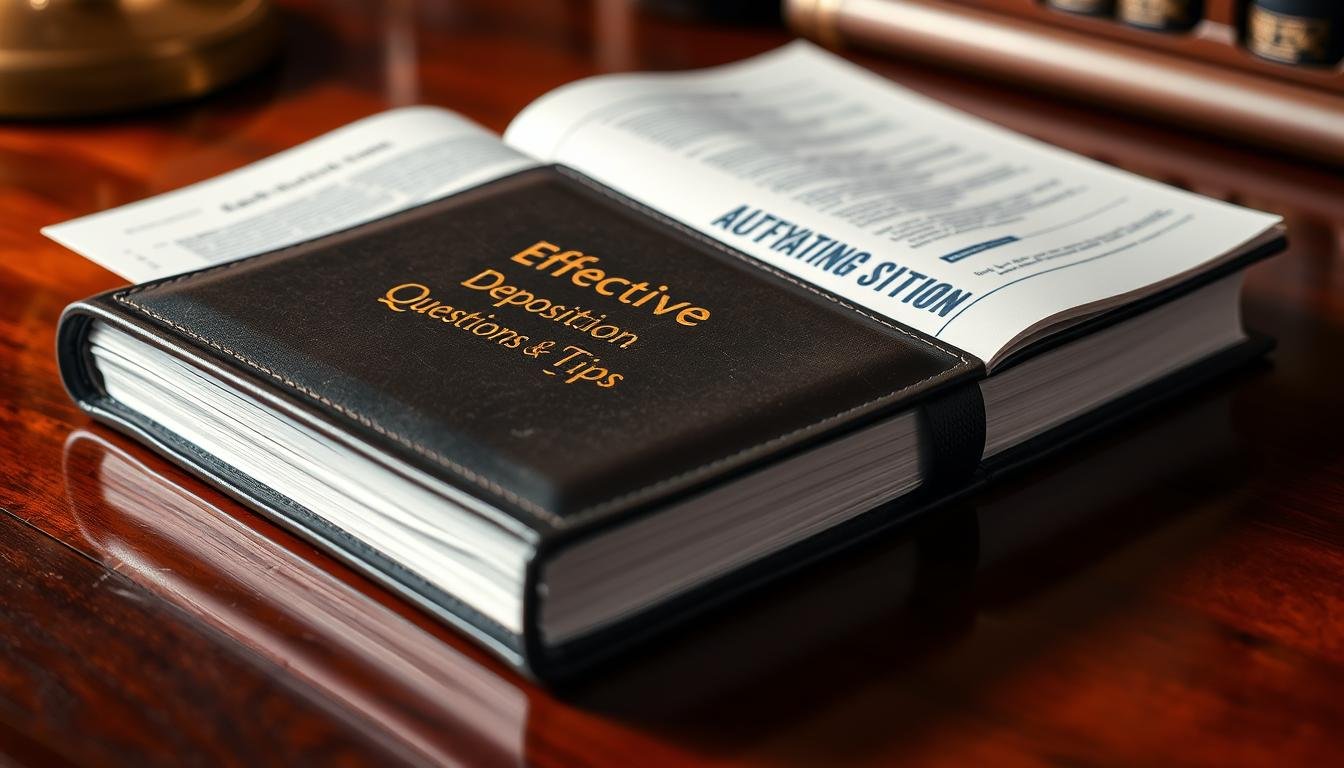In the intricate world of legal proceedings, mastering effective deposition questions can significantly influence the outcome of a case. This guide aims to empower attorneys and witnesses with essential deposition tips that enhance the discovery process. By understanding the nuances of deposition questions, you can improve your witness preparation and navigate the legal environment with confidence. Join us as we explore actionable insights and strategies that will elevate your skills in conducting and responding to deposition questions.

Understanding the Purpose of Deposition Questions
Grasping the concept of what is a deposition lays the groundwork for understanding the purpose of depositions in legal proceedings. This formal procedure involves a witness, known as the deponent, answering questions under oath. A court reporter records the entire session, making it an official part of the deposition process. These recorded responses play a crucial role in shaping the direction of legal cases.
What is a Deposition?
A deposition functions as a vital tool within the discovery phase of litigation. Attorneys use it to gather information from witnesses that may prove relevant to the case. By answering questions posed by opposing counsel, the deponent helps both parties clarify facts and assess the strengths and weaknesses of their positions. Understanding what is a deposition equips individuals involved in legal matters to navigate this process with greater confidence.
Why Are Depositions Taken?
The purpose of depositions extends beyond merely collecting testimony. They allow attorneys to uncover valuable details about a witness’s knowledge relevant to the case at hand. Furthermore, depositions can lock in testimony that may serve as pivotal evidence during trial. Gathering such information enables lawyers to evaluate the opposing side’s case more effectively and develop their strategies accordingly. Ultimately, depositions play a foundational role in preparing for litigation, underscoring their importance in the legal landscape.

Types of Effective Deposition Questions
When preparing for depositions, understanding the different types of questions becomes crucial. Each category serves a distinct purpose and can significantly impact the information gathered from the witness. Using a blend of open-ended questions, closed questions, and leading questions in depositions can lead to a more effective interrogation approach.
Open-Ended vs. Closed Questions
Open-ended questions encourage witnesses to elaborate on their experiences and thoughts. These questions allow for detailed responses that can reveal new insights and convey the witness’s perspective. In contrast, closed questions require brief answers, typically a simple “yes” or “no.” Closed questions serve to confirm facts quickly, but may lack the depth that open-ended questions provide. A balanced application of both question types helps attorneys extract comprehensive information during depositions.
Leading Questions: When to Use Them
Leading questions imply a certain response and can help guide a witness toward affirming specific points or clarifying their stance. These questions are useful when an attorney seeks to establish a fact or ensure consistency in testimony. Caution is critical; excessive use of leading questions can draw objections from opposing counsel, undermining the deposition’s flow. Strategic implementation enhances clarity while maintaining the integrity of the questioning process.
Preparing for Your Deposition: Key Strategies
Effective deposition preparation requires meticulous attention to detail in various aspects of your case. Engaging with your attorney provides the foundation for presenting your story confidently and coherently. One of the essential components involves reviewing case facts. This collaborative process helps reinforce key details, ensuring both you and your attorney have a unified understanding of the narrative.
Reviewing Case Facts with Your Attorney
Before stepping into the deposition room, you should spend time reviewing case facts with your attorney. This discussion encompasses an examination of evidence, witness statements, and possible outcomes. Such thorough preparation aids in refreshing your memory and aligning your testimony with the overall case strategy. Clarity in your statements will allow you to convey your account accurately and effectively.
Considering Potential Weak Spots in Your Case
It is equally important to consider potential weak spots in your case that opposing counsel might exploit during questioning. Identifying case weaknesses prepares you to respond to challenging inquiries openly and honestly. By acknowledging these vulnerabilities in advance, you can develop clear responses that address concerns while maintaining credibility. This proactive approach reinforces your position during the deposition and diminishes the chances of being caught off guard.
How to Deal with the Opposing Attorney
In the intricate dance of legal proceedings, dealing with opposing counsel requires a strategic mindset. Understanding opposing attorney strategy enables you to anticipate their moves and strengthen your position during deposition questions. Knowing the techniques they employ offers a significant advantage, allowing for more effective communication and responses.
Understanding their Strategy
Familiarity with the opposing attorney’s approach is crucial. By observing their prior cases and typical questioning styles, you gain insights into their goals. Attorneys often aim to discredit testimonies or coax negative admissions with carefully crafted questions. Recognizing these tactics can prepare you for their line of questioning and help maintain composure when under pressure, which is essential for success.
Responding to Challenging Questions
Responding to deposition questions, especially those that are challenging, requires a calm demeanor. When faced with aggressive or unexpected inquiries, take a moment to gather your thoughts before answering. Providing clear, concise, and honest responses is vital. Avoid falling into the trap of speculation or offering excessive information that could be detrimental. Staying focused and composed leads to more favorable outcomes.
Tips for Answering Deposition Questions
Effective answering deposition questions requires a thoughtful approach. The aim is to provide clear and accurate information without over-complicating your responses. Emphasizing the importance of concise answers can greatly improve the clarity of your testimony. This minimizes the potential for misinterpretation and keeps the focus on the questions being asked.
The Importance of Short Honest Answers
Utilizing the SHAQ method—Short Honest Answers to Appropriate Questions—plays a vital role in deposition settings. Keeping answers short not only maintains relevance but also limits the information that opposing counsel can use against you. This approach encourages straightforward responses, making your contributions clear and precise.
Handling Speculative Questions
In situations involving speculative inquiries, clarity becomes crucial. You should distinguish between what you know firsthand and uncertainties regarding the information. Acknowledging the limits of your knowledge can alleviate the risk of misrepresenting facts. By openly expressing uncertainty, you promote transparency and ensure your testimony remains reliable.
Effective Techniques for Asking Deposition Questions
Asking deposition questions effectively requires a thoughtful approach, especially when it comes to direct questioning. This method emphasizes clarity and simplicity. Crafting questions that are straightforward allows witnesses to respond without confusion. It is imperative to use clear language and structure to ensure that the witnesses understand what is being asked. This not only helps streamline the questioning process but also enhances the accuracy of the information gathered.
How to Craft Direct and Simple Questions
When engaging in direct questioning, attorneys should focus on formulating questions that leave little room for misinterpretation. Such queries can significantly improve the quality of the responses. A clear, concise question guides the witness to provide specific details necessary for the case. In this manner, attorneys can extract relevant information while maintaining the integrity of the deposition process.
Utilizing Funnel Questioning Techniques
Funnel questioning presents another effective strategy in asking deposition questions. This technique begins with broad, open-ended questions designed to encourage discussion. As the witness provides information, attorneys can gradually narrow down to specific inquiries. This helps uncover intricate details that might otherwise be overlooked. By guiding the conversation through layers of information, funnel questioning fosters a comprehensive understanding of the testimony. Legal professionals can leverage this approach to build a clearer picture of the case and ensure nothing vital is missed.
Common Pitfalls to Avoid in Deposition Questions
Depositions can present various challenges, and it is essential to navigate these deposition pitfalls effectively. A few common mistakes can significantly impact the quality and accuracy of responses. Understanding what to avoid can enhance overall performance and credibility during these proceedings.
Volunteering Information
One of the most significant deposition pitfalls is the tendency to volunteer information that was not specifically asked. This can create unnecessary complications and may introduce new issues for discussion. To maintain clarity, it is crucial to avoid volunteering information. Sticking strictly to the question limits the scope of the deposition and helps ensure that only relevant details are shared, preserving credibility and focus on the case.
Getting Rattled During Questioning
Feeling nervous during a deposition is entirely natural. Remaining calm during deposition is crucial for presenting oneself effectively. Agitation can easily be perceived, leaving a negative impression on opposing counsel and potentially influencing how a jury views the testimony. Employing techniques such as deep breathing, maintaining a steady demeanor, and focusing on delivering clear answers will assist in handling the stress of questioning while reinforcing confidence.
Preparation Techniques for Witnesses
Witnesses play a critical role in the deposition process, and understanding deposition role can significantly impact the effectiveness of their testimony. Adequate witness preparation techniques are essential to navigate this formal proceeding smoothly and effectively.
Understanding Your Role in the Deposition
Recognizing the function of a witness during a deposition is vital. Witnesses are expected to provide honest and concise responses to questions posed by attorneys. Unlike courtroom trials, depositions serve as an opportunity to gather testimony in a less formal environment. This understanding helps witnesses respond appropriately, ensuring their role contributes positively to the case.
Dressing Appropriately for the Occasion
The way a witness presents themselves can leave a lasting impression. Dressing for deposition in a professional manner reflects respect for the legal process. Appropriate attire not only sets a serious tone but can also enhance the witness’s credibility. Choosing clothing that aligns with the gravity of the situation helps in establishing a positive rapport with attorneys and jurors alike.
Ethical Considerations in Deposition Questions
Understanding the ethical considerations in deposition questions is vital for both legal practitioners and witnesses. Maintaining integrity throughout the process protects not only the individuals involved but also the judicial system itself. Striking the right balance between preparation and witness coaching can significantly impact the outcome of a case.
The Line Between Preparation and Coaching
Ethical witness preparation involves guiding witnesses on how best to communicate their thoughts. Attorneys can assist witnesses in expressing their perspectives more clearly while avoiding any form of coaching that influences the actual testimony. This distinction between witness coaching vs preparation is critical in ensuring that testimony remains authentic and truthful. Legal professionals must uphold ethical considerations deposition by educating witnesses without altering the essence of their statements.
American Bar Association Guidelines
The American Bar Association (ABA) outlines specific guidelines regarding witness preparation. These ABA witness preparation guidelines emphasize the importance of truthfulness in testimony. While it is permissible to refine a witness’s statements for clarity, the underlying facts of the testimony must reflect the witness’s genuine recollections. Legal representatives play an essential role in ensuring witnesses understand their obligations, thus helping to maintain ethical standards in the deposition process.
Conclusion
As we wrap up our exploration of deposition questions, it’s clear that mastering effective deposition strategies is essential for both attorneys and witnesses. This deposition questions summary emphasizes the importance of not only crafting insightful questions but also delivering honest and concise responses. Navigating depositions can feel daunting, yet with the right preparation and ethical considerations, participants can approach this process with confidence.
The techniques and guidelines discussed throughout this article serve as a roadmap for achieving clarity and professionalism in legal settings. By implementing these strategies, individuals involved in depositions can enhance their performance and contribute towards a favorable legal outcome. Ultimately, engaging in thorough preparation and upholding ethical standards ensures that everyone plays their part in a fair and just legal process.
In summary, embracing effective deposition strategies will greatly influence the success of your legal endeavors, making it vital to focus on clear communication and ethical conduct. These final thoughts on depositions reinforce the need for meticulous attention to detail, ensuring that each question posed and every answer provided leads to a comprehensive understanding of the case at hand.



